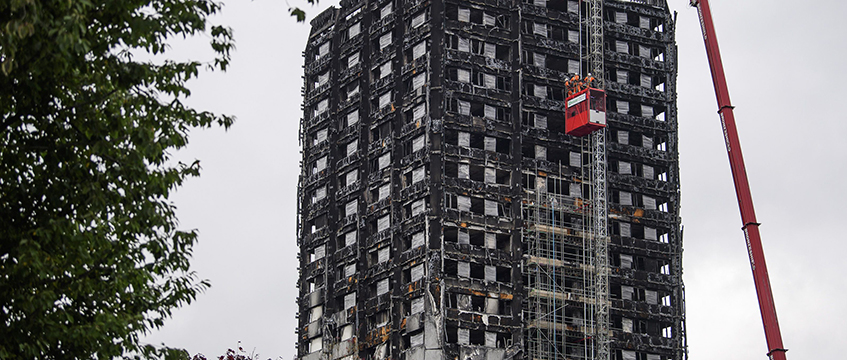Key points
■ Long leases meant that the freeholder had divested itself of any equity in the building
■ The costs of hiring fire wardens were reasonably incurred
■ The leaseholders are, in principle, responsible for the remedial costs to the building
After the tragic events of the Grenfell Tower fire in London last year, it was inevitable that litigation and other challenges would emerge before too long. A public inquiry into the circumstances has been established. Even though its results will be eagerly awaited, individual legal action is already occurring. The disaster has obviously caused concerns for residents and their landlords, and resolution of the issues raised will be needed, if only to sort out the present position on fire safety and the costs of ensuring buildings are safe. No doubt over the longer term other matters will be addressed, for example: what are the problems with using cladding over the walls of tower blocks? What are the alternatives?
Cladding: issues for landlords and their leaseholders
However, in advance of the results of the full inquiry, landlords and their managers need answers to immediate questions such as (a) what steps should be taken to check the existing level of fire safety in a particular block of flats; (b) if a fire warden or wardens are to be employed, who bears the costs; and (c) if physical works are required, who must pay? In addition, in those cases where the building is a block of flats with external cladding, does the cladding need to be replaced and, pending any remedial works, should fire wardens be employed to carry out inspections?
Clearly the answers will depend primarily on the wording of the relevant leases. Who is responsible for carrying out repairs? Are the proposed works “repairs”? Who under the leases must bear the costs? Issues such as the reasonableness of the charges will also have to be considered under the Landlord and Tenant Act 1985 (the 1985 Act).
The first case
The First-tier Tribunal (Property Chamber) (FTT) has given its determinations of two issues relating to tower blocks in Croydon, south London, in Firstport Property Services Ltd v The various long leaseholders of Citiscape [2017] UKUT 36 (LC); [2017] PLSCS 57. Not long after the Grenfell Tower fire, the managing agents and the leaseholders became concerned about the dangers posed by external cladding to the two blocks. The dispute concerned the costs of replacing the cladding and employing fire safety officers.
Tripartite leases (that is the freeholder, the individual leaseholder and a third party) with very long terms (originally for 999 years) were granted from 2001. Under these flat leases, the freeholder (now Proxima Properties Ltd) appears to have no repairing or maintenance obligations. These are instead vested in the other party to the lease (effectively the manager), now FirstPort, which made the applications to the FTT.
Each block has external cladding, and in the days following Grenfell (where it appears that the external cladding in that case may have contributed to the rapid spread of fire throughout the tower), the manager carried out a fire risk assessment of the Croydon blocks. It decided to employ a fire marshal to patrol the blocks with instructions to manage an evacuation in the event of fire. A second fire marshal was appointed later.
The manager assumed that the cladding might constitute a fire hazard. Its surveyor was asked for an opinion and reported that the costs of replacing the cladding would be in the order of £483,000. Later, however, externally appointed experts quoted fees of between £1.8m and £2.5m.
The decision
An application was made by the manager to the FTT for a determination as to whether the costs of the fire marshals, or the remedial works, were recoverable in principle under the leases and were “reasonable” as required by sections 18, 19 and 27A of the 1985 Act. The FTT decided that, on a proper reading of the lease (such as the leaseholder covenant to pay the costs of paying people in connection with the upkeep of the property), in principle a warden could be employed. It also found that the actual costs of this service were not unreasonable.
On the recladding costs, the FTT accepted the manager’s submission that the costs were incurred by the need to renew the cladding, a cost that in principle is recoverable under the leases. The tribunal concluded that by granting 999-year leases the original freeholder had effectively relinquished any capital interest in the flats. It was “reasonable to conclude” (paragraph 62 of the decision) that all future costs should be shared by the leaseholders.
As to the reasonableness of the sums involved, the tribunal rejected the submission made on behalf of the leaseholders that the lower estimate produced by the landlords was too low (an unusual submission, it is thought).
Thus the costs of recladding falls on the leaseholders.
The impact
This decision very much turns on its own facts. The tripartite nature of the leases seems to have been a decisive point in the decision, with the FTT concluding that, as the freeholder had in effect divested itself of the equity in the building, it was reasonable to conclude that the leaseholders would bear the costs of works incurred under the leases.
It has subsequently been announced that the developer Barratt will bear the remedial costs in respect of these blocks and former housing minister Sajid Javid has said that other property owners and housebuilders should follow Barratt’s example. However, many questions remain, which will doubtless be raised by future cases.
James Driscoll is a solicitor and a writer








